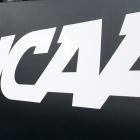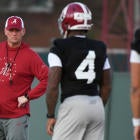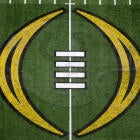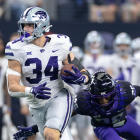WASHINGTON, D.C. -- With name, image and likeness rights becoming a boiling point for college sports, NCAA president Mark Emmert said Tuesday that granting athletes such rights would be an "existential threat" to the collegiate model.
Emmert on Tuesday, while speaking to a group of Division I athletic directors, called the current debate over name, image and likeness rights the "single biggest issue" in his almost-decade on the job.
California governor Gavin Newsom is expected to sign into law the Fair Pay to Play Act, a bill that would grant athletes in that state the ability to profit off their name, image and likeness. That would include the ability for players to earn money from commercials, endorsements and other business ventures.
The NCAA Board of Governors told California legislators that such a law is "unconstitutional" and could render ineligible college athletes at the 58 NCAA schools in that state.
Some California legislators have responded sternly. Bill sponsor Rep. Sydney Kamlager-Dove (D) said, "NCAA, don't threaten California. Don't threaten us."
"This whole notion that our letter was threatening is ridiculous," Emmert said. "We simply said, 'Here is one of the problems that will exist.' That wasn't a threat. It was, 'Look, folks, we can't have one state operating different rules than the others.'"
When Newsom signs the bill, Emmert said he would like to see California officials "tone down some of the rhetoric."
Resolution on name, image and likeness is complicated. Emmert continued to call any further athlete compensation from it "pay for play." An NCAA working group formed in May to explore the issue is expected to issue its first report in October. However, a formal change in NCAA legislation addressing name, image and likeness may not be in place until 2021.
When passed, the California law will not go into effect until January 2023.
Changing those decades-old rules would be seminal moment in college athletics. The collegiate model limits athletes' scholarships to room, board, books, tuition and a cost of attendance stipend.
However, the definition of amateurism has been a moving target through the decades. The NCAA has adjusted when issues like this came up in the past, whether it be through altruism or legal threats.
This is a "huge, huge issue. As big a one as we've seen in modern times," Emmert said.
Granting name, image and likeness rights would allow athletes to be compensated for what is everyone else's birthright. Proponents argue that the violin prodigy in college is allowed to play in Carnegie Hall. Athletes wearing their school's gear can't establish their own YouTube channel.
The NCAA has long argued that further compensation beyond the current model would blur the lines between amateurism and professionalism.
"My personal view is folks in general think that every student-athlete is going to be making hundreds of thousands of dollars," Emmert told CBS Sports. "One or two will be making some significant amount of money. Nobody else will."
Proponents for name, image and likeness rights argue that players have already been compensated for years. The NCAA allows free insurance premiums for athletes entering the NFL Draft, bowl gifts, health care and that aforementioned cost of attendance stipend.
SEC student-athlete representative Blake Ferguson, an LSU long snapper, told CBS Sports earlier this year he "makes" $12,000 a year counting scholarship checks, cost of attendance and other NCAA-allowed benefits.
Judge Claudia Wilken took the NCAA to task earlier this year in her decision in the Alston vs. NCAA anti-trust lawsuit that sought full market value for athletes. She called some current benefits provided by the NCAA, essentially pay-for-play that Emmert is so against.
Emmert was asked if the NCAA could become a partner with players in marketing their name, image and likeness.
"You've got 50 different states with 50 different labor law rules," Emmert said. "If you move into what are, in essence, labor negotiations, you have to do that state-by-state … It just falls apart in its complexity."
A handful of states are considering laws similar to the one California has passed through its legislature. Emmert asked university athletic directors for their ideas for resolution on the issue before the NCAA has to take on name, image and likeness laws on a state-by-state basis.
Several ADs at the gathering told CBS Sports there is no national consensus in their business for or against changes to the name, image and likeness rules.





















